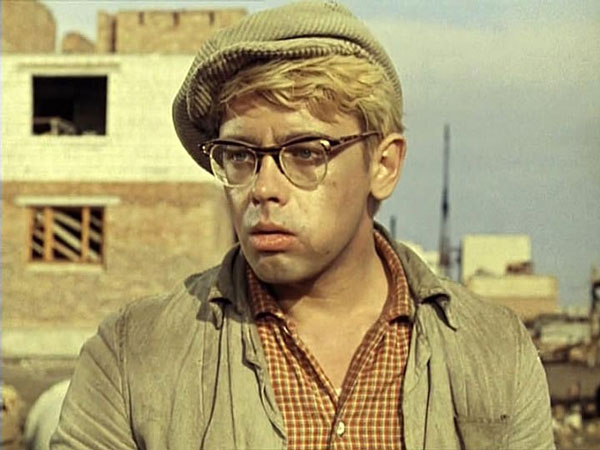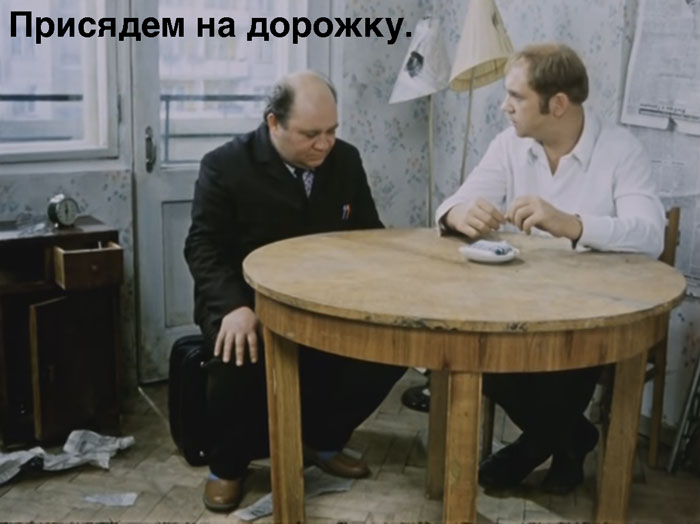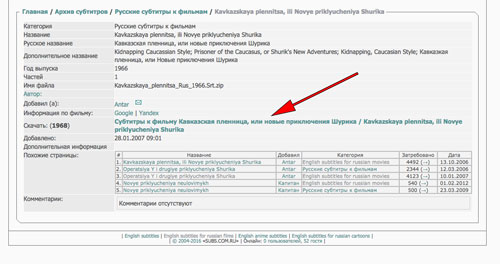If we asked a Russian what’s the most popular classic comedy of their кино, I bet the winner would be Операция “Ы” и другие приключения Шурика (Operation “Ы” and other adventures of Shurik – 1965).
Shurik is a naive and nerdy Soviet student who often gets into ludicrous situations but always finds a way out very neatly.

The film consists of three independent parts that you can watch here with English subtitles. Note that this link is now unlisted by Mosfilm. This means that you can’t get the film with a simple search on YouTube, but you need to have this particular link to watch it for free. I managed to get it a few months ago along with other links before Mosfilm switched many titles to paid content.
In this article, I have picked the dialogue of the very first scene on the bus. Below, you can watch it twice, both with English subtitles and Russian subtitles. I can’t stop laughing every time I watch it!
I’ve also included a step-by-step guide on how to read the whole transcript (Russian text) of the film on your browser.
Приключения Шурика – The Film
Приключения Шурика – The Dialogue
Садись, дочка. – Sit down, daughter.
Ничего, ничего. Спасибо, сидите. – It’s OK, it’s OK. Thanks, stay seated.
Гражданин, уступите место, встаньте. – Sir, let her sit, stand up.
Если я встану – ты у меня ляжешь. – If I stand up, you will lie down.
Гражданин, эти места – специально для детей и инвалидов! – Sir, these seats are especially for children and people with disabilities.
А она что – дети или инвалиды, а? – And who is she? “children” or “people with disabilities”?
Она готовится стать матерью! – She is getting ready to become a mother.
А я готовлюсь стать отцом! – And I’m getting ready to become a father.
Вы что ерунду порете? – What nonsense are you talking about?
А вот как раз инвалид! – Oh, here is a man with a disability.
Ааа инвалид – что теперь скажете? – Ahhhh, a man with a disability. What are you going to say now?
Простите. – Excuse me.
А, закон есть закон! – The law is the law.
Пожалуйста, садитесь. – Please, sit down.
Большое спасибо. – Many thanks.
Ах, ты зрячий? – Oh, you can see???
Ну, сейчас будешь слепой! – Well, now you will become blind!
Приключения Шурика – The Analysis
Садись, дочка! – Sit down, daughter.
садиться – to sit down (imperfective)
(сажусь, садишься, садится, садимся, садитесь, садятся)
You see that the old lady uses the word садись (informal – ты садись) when talking to the younger woman. That’s acceptable. She also calls her дочка in a tender way.
If the young woman wanted to say “have my seat” to the old lady she would have said instead садитесь (formal – вы садитесь).
We will see that Shurik uses the word садитесь when speaking to the young woman a little later.
The young lady responds with:
Ничего, ничего! – It’s OK, it’s OK!
Remember the phrase ничего страшного – no worries (lit: nothing to be feared of)
страшно – frightfully
страшный сон – terrible dream, nightmare
страх – fear
сидите – sit, stay seated
сидеть – to sit (imperfective)
(сижу, сидишь, сидит, сидим, сидите, сидят)
Я сижу на кровати. – I’m sitting on the bed.
кровать – bed
Я сижу на диване. – I’m sitting on the couch.
диван – couch
Сидите is what the young woman says to the older lady, so it’s formal (вы сидите).
посидеть – to sit (perfective)
You can say:
посиди́м на дорожку – let’s sit for the journey
дорога – road → дорожка – “little road” (diminutive)
This is a Russian habit to sit down for a moment before setting off on the journey. It sounds like a useful habit as you stop to think for a moment to check that you have everything.
You will also hear присядем на дорожку.
You can listen to this exact phrase in the film Афоня here.

присесть – to sit down, squat
The prefix при- here means “a little” (to sit for a moment).
You can say after a busy day:
За весь день ни на минуту не присел! – The whole day I didn’t sit down not even for minute!
Мне это слово ни о чем не говорило. – This word didn’t say (didn’t mean) anything to me. (previous article – любовь настала)
За весь день ни на минуту не присел! – The whole day I didn’t sit down not even for minute!
Встаньте, гражданин! – Stand up, citizen!
гражданин – citizen
The term товарищ – comrade was established as an “ideologically correct” way for Soviet people to call each other; the term гражданин had more formal usage, e.g. in public announcements, or to call someone who is socially unequal to you (any official and commoner, especially militiaman and violator, prisoner, etc. and can be used both ways).
встать – stand up (perfective)
(встану, встанешь, встанет, встанем, встанете, встанут)
Встань! – Stand up! (informal)
Встаньте! – Stand up! (formal)
вставать – imperfective
я встаю – I stand up
These verbs can also mean to get up from bed:
Я встаю в 7 часов утра каждый день. – I get up at 7 o’clock in the morning every day.
уступите место – give the place
уступить – give up, let have
(уступлю, уступишь, уступит, уступим, уступите, уступят)
Если я встану, ты у меня ляжешь. – If I stand up, you’ll lie down.
лечь – lie down (perfective)
(лягу, ляжешь, ляжет, ляжем, ляжете, лягут)
ложиться – lie down (imperfective)
(ложусь, ложишься, ложится, ложимся, ложитесь, ложатся)
A very common phrase is:
ложиться спать – lie down to sleep
Во сколько ты ложишься спать? – When do you lie down?

Гражданин, эти места – специально для детей и инвалидов! – Citizen, these seats are especially for children and people with disabilities.
место – seat, place
места – seats, places
Remember для takes genitive case. So,
детей is the genitive case of дети – children
инвалидов is the genitive case of инвалиды – people with disabilities
дети (children) – детей
люди (people) – людей
родители (parents) – родителей
Note: Accusative Plural is the same as Genitive Plural for animate nouns!
На улице много людей сегодня. – There are lots of people today on the street (genitive case).
Я вижу людей на улице. – I see people on the street (accusative case – людей, direct object).
А она что – дети или инвалиды, а? – Who is she??? “Children” or “people with disabilities”, ah?
He takes the law “very literally”! The pregnant woman is neither “children” nor “people with disabilities” so he can keep his seat safely. 🙂
Что вы ерунду порете? – What nonsense are you talking about?
пороть ерунду – talk nonsense (set phrase)
ерунда – nonsense, something that’s not important
Не расстрайвайся! Это всё ерунда. – Don’t worry, that’s all nonsense (something not worth of worrying about).
This is an interesting article which explains the origin of ерунда.
Она готовится стать матерью. – She is getting prepared to become a mother.
стать + instrumental case
готовить – to cook, to prepare
готовиться – to prepare myself
готовиться к экзамену – to prepare for exam
You remember к takes dative case. So:
экзамену – dative case of экзамен – exam

мать – mother
матерью – instrumental case
like
осенью – in the autumn
осень – autumn (feminine)
ранняя осень – early fall
А я готовлюсь стать отцом! – And I am getting ready to become a father.
стать отцом – to become a father
отец – father
отцом – instrumental case
like
стать учеником – become a student
ученик – student
or…
стать врачом – become a doctor
врач – doctor
А вот как раз инвалид! – Ahh here is a man with a disability!
как раз – just, exactly
Как раз то, что мне нужно. – Just what I want.
Ааааа инвалид- что теперь скажете? – Aaahh a man with a disability, what are you going to say now?
сказать – to tell (perfective)
(скажу, скажешь, скажет, скажем, скажете, скажут)
Note that Ж becomes again З in the past tense:
сказал – сказала – сказало – сказали
What’s the imperfective pair of сказать?
говорить – to say
теперь – now
Простите. – Excuse me. (formal)
простить – to excuse, pardon
(прощу, простишь, простит, простим, простите, простят)
DON’T CONFUSE WITH просить!!!
просить – to ask, request
(прошу, просишь, просит, просим, просите, просят)
А, закон есть закон. – The law is the law.
закон – law
There is another phrase:
Люди есть люди. – There are all sorts of people (people are different, i.e. good and bad).
Пожалуйста, садитесь. – Please, sit down.
As we said earlier, Shurik also uses the formal imperative of the verb садиться – to sit down
Большое спасибо. – Many thanks. (lit: “big thanks”)
Большое – big (neuter form)
Большой дом – big house
Большая комната – big apartment
Большое спасибо – big thanks
Ах, ты зрячий? – Oh, you can see???
зрячий человек – sighted person
Ну, сейчас будешь слепой! – Well, now you will become blind!
слепой – blind ≠ зрячий – sighted
слепая вера – blind faith
будешь – you will be (future tense of быть – to be)
(буду, будешь, будет, будем, будете, будут)
Read the Film Transcript on your Browser
You can follow the below steps to open up all the film dialogues on your browser using the Russian subtitles file.
- Go to this page and click on the link next to “Скачать” (скачать means download by the way) as shown below:

- Unzip the file you’ve just downloaded. You will see three .srt files (subtitle files).
- Drag and drop the first file on your browser and it will automatically open it up as a text file.
- In case you see some weird characters and you use Chrome or Internet Explorer, go to View – Encoding and choose Cyrillic (Windows-1251). For Firefox the menu item should View – Character Encoding.
- Voila! You can now split your screen into two windows, one with your film and the other with the Russian text.
I hope you enjoyed Shurik’s first adventure! Part II is coming soon!
If you enjoyed this article, please share to your favorite social media platform!
До скорого,
Ангелос

Angelos, I’ve just started to study Russian and I’d like to congratulate you. Thanks to your work, I can listen to songs, watch movies and learn with your articles. Please keep doing this. One thing that I like to suggest you is to criate more lessons with poems or maybe short stories. Chekhov, Tolstoi, Dostoevsky and so many others great writers had written in Russian. It would be a beautiful work to use their texts to teach their language.
Thanks once again,
Arthur
Athur, thank you very much for your kind words. I’m planning to write articles on short stories, yes! Thanks for your recommendation. Stay in touch, Angelos